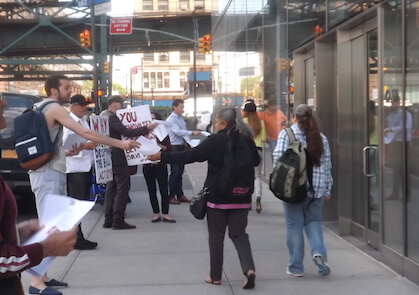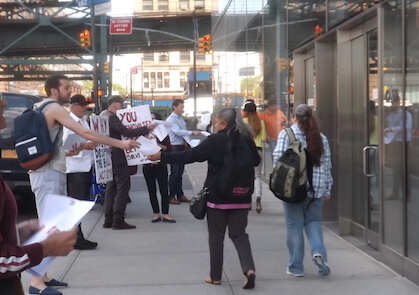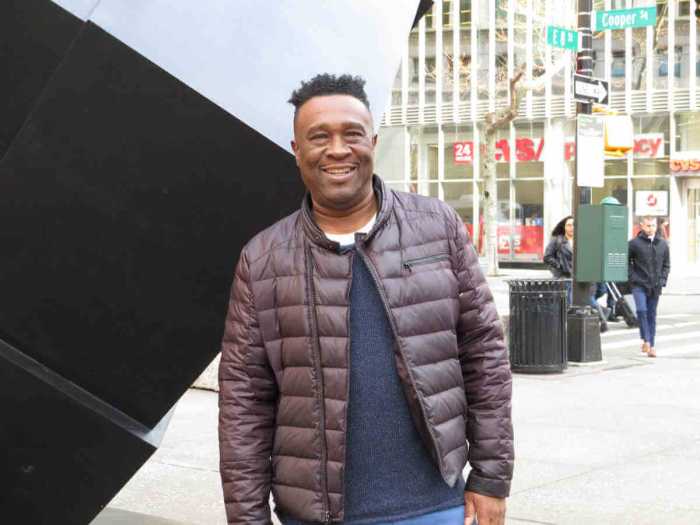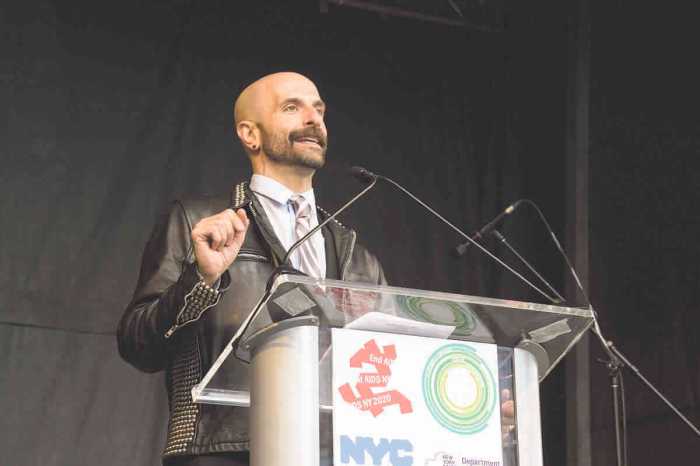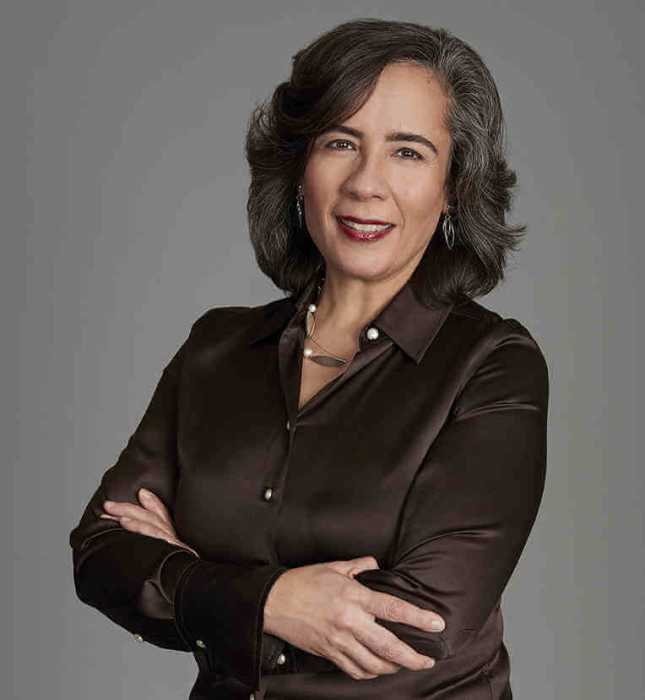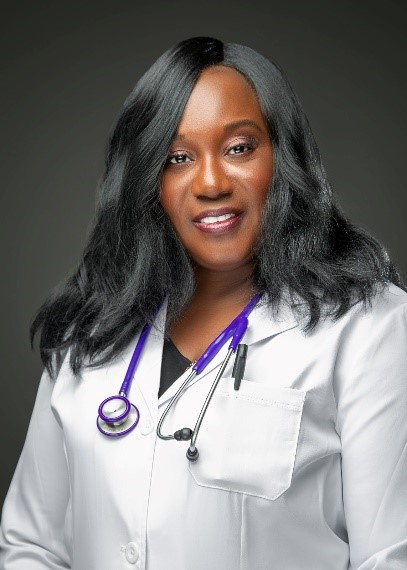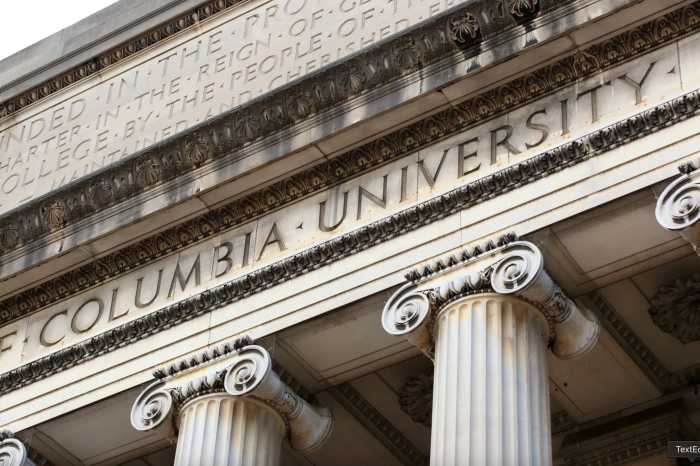Members of ACT UP New York flyer outside a health department office in Queens on May 13.n | GAY CITY NEWS
New York City’s health department is facing growing demands to replace the services that were eliminated when it shuttered its Chelsea sexually transmitted disease clinic for two years during a $17 million renovation of that facility.
“This action poses an immediate and severe threat to the public health of the City, not only to Chelsea residents, but to all of New York City’s lesbian, gay, bisexual, and transgender (LGBT) communities,” six leading AIDS groups wrote in an April 30 letter to Mayor Bill de Blasio and to Lilliam Barrios-Paoli, the deputy mayor for health and human services. “This action, if not immediately remedied… will undoubtedly result in excess HIV and other [sexually transmitted disease] infections.”
The letter came from the heads of the Treatment Action Group, Housing Works, Harlem United, Gay Men’s Health Crisis, VOCAL-NY, two members of ACT UP New York, and Ginny Shubert, a leading housing and healthcare consultant. Dr. Mary T. Basset, the city’s health commissioner, was copied on the letter as were other senior health department staff.
Service providers, ACT UP demand provisional services, support for private clinics as neighborhood stopgap
The letter asked that the health department immediately “deploy mobile HIV/ [sexually transmitted infections] testing and care vans to well-publicized locations within Chelsea and continue there at least until permanent fixed venue(s) become available for use” and that the department “establish one or more fully-staffed and equipped HIV and STI screening, treatment, and linkage-to-care clinics in Chelsea until at least the completion of the current reconstruction.” The letter’s authors also asked for funding for existing private clinics that could provide the services that were previously supplied by the Chelsea clinic.
First opened in 1937, the Chelsea clinic is one of nine such clinics that the health department operates. In 2014, it had 19,243 visits and contributed 23 percent of the 83,000 visits to all the clinics last year. The next highest total was reported by the Fort Greene clinic in Brooklyn, which had 12,472 visits and contributed 15 percent of the total visits.
While the renovation is clearly necessary, the lack of resources to at least temporarily replace the loss of services at the Chelsea clinic is frustrating activists. The health department is clearly aware of that.
“We did not take that decision lightly, but there was no easy answer,” said Dr. Sue Blank, who heads the sexually transmitted disease unit at city’s health department, during an April 22 meeting of the Stonewall Democratic Club of New York City, an LGBT political group. “We still have other clinics that are a subway ride away.”
For years, Chelsea and Hell’s Kitchen have had the highest rate of new HIV diagnoses and the highest rate of syphilis cases in the city. Both rates are driven by new infections among gay and bisexual men. Those neighborhoods also have high rates of gonorrhea and hepatitis C. Closing the clinic makes addressing these high rates harder.
The Chelsea clinic’s high volume of visits also represents an opportunity to identify LGBT New Yorkers who are candidates for pre-exposure prophylaxis (PrEP), which involves giving anti-HIV drugs to HIV-negative people to keep them uninfected. PrEP is a major component of the Plan to End AIDS in New York, which has been endorsed by de Blasio and Governor Andrew Cuomo. The plan aims to reduce new HIV infections from the current roughly 3,000 annually to 750 a year by 2020. The Chelsea clinic has the potential to be a significant resource in that plan.
A sign posted outside the Chelsea clinic, which closed on March 21, refers visitors to the clinic on West 100th Street. That clinic had 6,377 visits in 2014 and contributed eight percent of all clinic visits last year. The health department did not respond to a request for data on visits to each of its clinics for the month of April in 2015, 2014, and 2013, so there is no way of knowing if more people are now using the West 100th Street clinic.
“A month after having shuttered the clinic, there’s no substitute,” said Jim Eigo, a member of ACT UP New York during that group’s May 11 meeting. “I think at the very least, the health department should have convened a community meeting.”
ACT UP New York sent a second letter to Bassett on May 5 asking for a meeting, and on May 13 a half-dozen members of the AIDS activist group distributed several hundred flyers that mirrored the content of the April 30 letter to health department employees outside the Queens office of that agency.
City Councilmember Corey Johnson, who represents Chelsea and is the Health Committee Chair is convening a meeting of the health department and community groups on May 15. The goal of the meeting is to “ensure there is a continuation of services in the neighborhood,” Johnson told Gay City News.
Permits for the renovation were approved last year by the city’s Department of Buildings, as early as 15 months ago.

